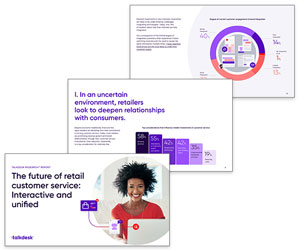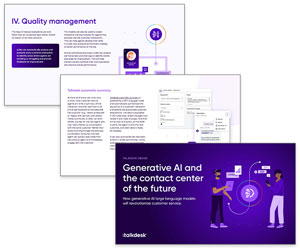We discuss how you can improve customer service with the help of emotional intelligence.
There are many strategies for improving customer service out there, but if you are looking to build a culture of continuous improvement, emotional intelligence may just be the missing ingredient that you need.
Building a Culture on Emotional Intelligence
To consistently improve customer service, the aim is to build call centre culture that resonates with your teams and fills them with a purpose that motivates them to perform at a high level.
How can you do this? Through understanding emotional intelligence and applying that to how you manage the call centre.
Emotional intelligence is related to how people feel and perceive things, and these perceptions are influenced by a number of different factors, including:
- What do you see?
- What do you hear?
- What do know?
- What are you doing?
Managing all these factors at any one time is an impossible task – especially with more and more remote working – but you can positively influence them if you instil the right value systems into the call centre.
This can be achieved by addressing the six areas below, which will enable you to build a culture on the foundations of emotional intelligence.
If you are looking for how to improve customer experience with emotional intelligence, read our article: Creating Memorable Customer Experiences With Emotional Intelligence
1. Recruitment
In a contact centre, managers will look for advisors to come in and immediately understand how they want customers to feel when they leave a call. They want emotionally intelligent advisors.
These advisors are resilient, focus on the tangible and only deal with the here and now, which means that your customers feel like they are the focus of all the attention.
But how can you attract emotionally intelligent advisors?
Target certain behaviours once you begin the actual hiring process. This comes back to the old principle of hiring for attitude and training for skills.
The answer is to offer a range of packages which will attract all kinds of people to widen your recruitment pool. You could then also target certain behaviours once you begin the actual hiring process. This comes back to the old principle of hiring for attitude and training for skills.
These tips will help you to hire the right people. But once you have done this, you need to look after them well and get them to buy into your value system right from the off.
For more tips on improving your contact centre recruitment, read our article: How to Write a Successful Recruitment Strategy
2. Values
Values establish attitudes that are reflected in behaviours, according to Dawn Redman, Principal Consultant at CCX Consulting.
You will not see a long-term change in the behaviours of your people until they buy into your values.
“You will not see a long-term change in the behaviours of your people until they buy into your values,” says Dawn.
So, take a look at your organizational values. Are they relevant to what you do in the contact centre and beyond?
Everybody that is currently working in the contact centre has a value system. This will vary depending on life experience, how they were raised, their belief system, etc.
You should understand the values your people have, before you let them loose on your customers – so you can establish the right attitudes and behaviours on the contact centre floor.
3. Leadership
When you walk into a call centre, you notice that it is a living, breathing place. Advisors are your frontline culture, which should align to the values that customers perceive your organization to have. That’s what attracted them to your organization in the first place.
This “feel” of your call centre environment is driven by your senior leadership team, so these people better be well trained and good, really good.
But what are the characteristics of a really good team leader? There are a number of things, of course, but a leader with emotional intelligence will be sure to do the following:
- Find Meaning in the Call Centre Work – A good leader won’t just tell the team how to do something, they’ll tell them why. This builds purpose, and if you can link this purpose back to your values, you can get your team better invested in your customer service values.
- Set High Standards – A contact centre with high standards challenges its team and better retains its best advisors. If you discuss these standards with advisors and agree how you both will behave to get work done in 1-2-1s, huddles and lunch-and-learn sessions, you can positively impact culture.
- Use Advisor Strengths as Motivational Tools – By actively searching for an advisor’s strengths, you can further encourage behaviours that drive positive outcomes. A good leader will therefore put in the effort to catch people doing good things.
For more qualities of a great leader and how to develop them in the contact centre, read our articles: Train Team Leaders Well and Team Leadership: What Makes a Great Leader?
4. Resilience
You cannot necessarily train emotional intelligence, but you can build it into your contact centre by developing advisor skills like resilience.
“The key is to learn the lessons of failure, and then you have to coach in the good stuff,” says Dawn.
Remember to look for the silver lining in every call and tell the advisor: “That was brilliant, absolutely brilliant. Try that again.”

The key is to learn the lessons of failure, and then you have to coach in the good stuff.
Then, with that positive reinforcement, the advisor will try it again and this way of giving feedback will continue to build the emotional intelligence and resilience within that person.
By building resilience, an attitude that you should also be looking out for in recruiting, you are not just increasing an advisor’s ability to accept negative feedback and quickly recover from difficult conversations, but you are also creating an ability to focus.
The ability to reset and focus on a new customer conversation, without carrying over any fatigue or perhaps ill-feeling, is a very desirable skill of an emotionally intelligent advisor.
Find out how to improve customer service skills like resilience by reading our article: The Top 10 Most Important Customer Service Skills
5. Perspective
Emotionally intelligent advisors not only have the ability to focus on the here and now, they also deal with only the tangible, but will do so with a great deal of perspective.
Why does that matter?
Well, if you have an angry customer, for example, who just wants to tell you how poorly they have been treated, an advisor with perspective will listen, agree and empathize with them naturally.
If you have an angry customer, for example, who just wants to tell you how poorly they have been treated, an advisor with perspective will listen, agree and empathize with them naturally.
By doing so, the advisor is dealing with the tangible in how that customer feels and is validating the customer’s view of your organization at this time.
Then, the advisor can work with that, state what they will do to put the situation and the customer’s view right and take ownership of the call.
This is just one example of why it’s important to coach perspective and avoiding assumptions. Remember, an advisor’s mindset seeps into their approach to handing customer calls – which has great bearing over whether they want to improve or not.
6. Culture
Each of the previous five points has a bearing on your culture, and if you want to improve customer service, culture is the key consideration.
When thinking about culture, you must look at:
- Who will fit in with you?
- Will they want to stay?
- How will you sell this?
Dawn Redman discusses each of these three points in the video below, when challenging you to define and deliver on your contact centre culture.
Taking this all into account, you have one question for you: do you understand your current contact centre culture? The answer at this stage is “no”.
The best way to find out is by asking your advisors, because they live and breathe it.
So, ask everybody to write down a few words to describe your current culture and then a few words to describe the culture that they want. This will help you to find out where your culture currently is and where you can take it, for increased engagement and improved customer service.
Just as a little caveat to that, don’t be shocked at the results, because you might be.
For more on generating a great contact centre culture, read our article: The Importance of Call Centre Culture and How to Improve It
Final Thoughts From Our Readers
To close this article, we’ve had lots more suggestions put forward by our readers regarding how they improved their customer service culture.
Below are five of our favourite pieces of advice that were sent in.
Ask: What Do You Need to Succeed?
When we meet for one-on-ones, I ask my team members: what do you need to succeed?
Just be careful, though, as these needs change, despite the fact that we are just three months in. So, be sure to adapt accordingly.
For example, I just moved a rep to a split shift to accommodate being a full-time worker, mother and a teacher.
Thanks to Amanda
Find more examples of good conversations to have with your advisors in our article: 10 Great Conversations to Have With Your Contact Centre Team
Give Sunshine Compliments
We send out “sunshine compliments” to advisors and include the senior leadership team in the compliment email when we receive positive comments from clients about an advisor.
Also we send “Spot On” awards for positivity, going the extra distance to provide client support, to give additional praise to recognize when an advisor does a great job in representing our organizational values.
Thanks to Sandra
Pass Over Coaching Control
We have been motivating our team by coaching in areas they choose. This has ranged from call listening to carrying out peer-to-peer coaching to storytelling to encourage colleagues to share their experiences.
They have all really enjoyed the added responsibility and it removes the pressure from the leadership team to be solely responsible for “writing our own headlines”.
Thanks to Caitlin
Sell Your Organization’s Story
One interesting way to improve your customer service culture with emotional intelligence is to motivate people by storytelling.
Stories help us feel a part of something larger than ourselves, they give purpose. This is all while smuggling beliefs and information into our brains in an emotive and memorable way.
Thanks to Tom
For more on using storytelling in the contact centre, read our article: Storytelling: The Modern Way to Increase Staff Motivation
Use the “E2C2” Feedback Model
When looking to grow skills such as resilience and perspective, it can work well to change up your methods of giving feedback. You could use the E2C2 model, for example.
As the coach, you use this model to first state what you have observed and what’s the EVIDENCE.
Then, remind the advisor of the impact and the EFFECT of that behaviour and what you want the advisor to CHANGE or CONTINUE working on or do differently.
Thanks to Garry
For more of our advice on how to improve customer service, read our articles:
- 4 Customer Service Objectives That Will Improve Productivity and Customer Experience
- Customer Service Skills: How to Improve Empathy, Active Listening and Knowledge
- 18 Ways to Improve the Effectiveness of Your Digital Customer Service
Author: Robyn Coppell
Reviewed by: Megan Jones
Published On: 7th Oct 2020 - Last modified: 25th Mar 2024
Read more about - Customer Service Strategy, Culture, Customer Service, Editor's Picks, Emotion


















